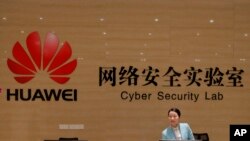Chinese telecom giant Huawei said Thursday it was suing the United States for barring government agencies from buying the telecom company's equipment and services.
Huawei said the suit was filed in a US District Court in Plano, Texas, challenging a 2019 U.S. defense bill that prevents US government agencies from buying Huawei equipment and services, as well as working with third parties that are Huawei customers.
The lawsuit is Huawei's latest attempt to fight back against US warnings that the company could serve as a Trojan horse for China's intelligence services.
"The U.S. Congress has repeatedly failed to produce any evidence to support its restrictions on Huawei products. We are compelled to take this legal action as a proper and last resort," Huawei's rotating chairman Guo Ping said in a statement.
"If this law is set aside, as it should be, Huawei can bring more advanced technologies to the United States and help it build the best 5G networks."
The United States says Huawei equipment could be manipulated by China's Communist government to spy on other countries and disrupt critical communications.
Washington is urging governments to shun the company just as the world readies for the advent of ultra-fast 5G telecommunications, an advancement that Huawei was expected to lead and which will allow wide adoption of next-generation technologies like artificial intelligence.
Huawei has responded with an aggressive PR campaign to counter the U.S. warnings, with reclusive founder Ren Zhengfei denying the fears in a series of foreign media interviews.
The charm offensive went into another gear Wednesday as Huawei welcomed news organizations on a tightly guarded tour of its massive production lines and research and development facilities in southern Guangdong province.
Huawei's Chief Financial Officer Meng Wanzhou, Ren's daughter, faces potential extradition from Canada to the United States over charges of Iran sanctions violations.
The U.S. Justice Department accuses Huawei and Meng of circumventing US sanctions against Iran. Two affiliates also have been charged with stealing trade secrets from telecommunications group T-Mobile.
Meng faces a May 8 hearing in Vancouver, where she was arrested while changing planes.
Two Canadians have been detained in China in suspected retaliation over her arrest.




